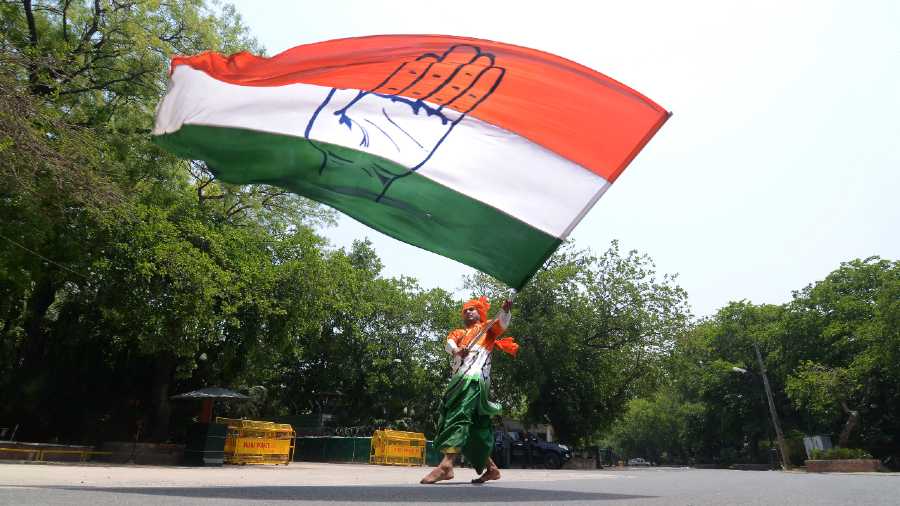The Supreme Court on Wednesday upheld the constitutionality of the Prevention of Money Laundering Act, 2002, relating to the Enforcement Directorate’s overarching powers, including those for “search, seizure, summoning and arrest”, and the stringent bail conditions.
The judgment comes at a time the Narendra Modi government has been accused of misusing the ED and the PMLA against critics and political opponents, and coincides with the agency’s questioning of Sonia Gandhi that has been termed a “political vendetta”.
The BJP was quick to claim vindication although the court was dealing with the legality of some of the stringent provisions in the act. The main charge of the Opposition is the misuse of the act, which has been in existence for 20 years but has been used with unusual vigour and zeal only after the Modi government came to power.
“Money-laundering is one of the heinous crimes, which not only affects the social and economic fabric of the nation but also tends to promote other heinous offences, such as terrorism, offences related to NDPS Act (relating to narcotics), etc,” the bench of Justices A.M. Khanwilkar, Dinesh Maheshwari and C.T. Ravi Kumar said.
“It is a proven fact that international criminal network that supports home-grown extremist groups relies on transfer of unaccounted money across nation states, thus, by any stretch of imagination, it cannot be said that there is no compelling State interest in providing stringent conditions of bail for the offence of money-laundering.”
With the 545-page judgment, the apex court has disposed of a batch of nearly 250 petitions moved by various individuals challenging different provisions of the PMLA.
Bail
One of the challenges related to the bail conditions under Section 45, which says bail can be granted only after hearing the public prosecutor’s views and after the special court forms a prima facie view of the innocence of the accused.
Neither condition applies to ordinary police cases, where bail can be granted on grounds such as there being no need to further question the accused or the accused not being a flight risk.
Justice Khanwilkar, who authored the verdict, wrote that while the “twin conditions… restrict the right of the accused to grant of bail”, they do not “impose absolute restraint on the grant of bail”. “The discretion vests in the court which is not arbitrary or irrational,” the judgment said.
It added that the expression “reasonable grounds for believing” in Section 45 “means the court has to see only if there is a genuine case against the accused and the prosecution is not required to prove the charge beyond reasonable doubt” for the denial of bail.
The judgment said there were enough safeguards for the accused, anyway.
“Moreover, the arrested person before being produced before the special court within twenty-four hours or for that purpose of remand on each occasion, the court is free to look into the relevant records made available by the authority about the involvement of the arrested person in the offence of money-laundering,” it said.
“We hold that the provision… is reasonable and has direct nexus with the purposes and objects sought to be achieved by the 2002 Act to combat the menace of money-laundering having transnational consequences, including impacting the financial systems and sovereignty and integrity of the countries.”
ECIRs
The court said the ED was not required to furnish a copy of the ECIR (enforcement case information report) — considered on a par with the police FIR that has to be mandatorily provided to the accused — as long as the accused had been told the grounds for the arrest.
The ECIR may contain details of the material in possession of the ED and the reason why it believes that the accused is guilty of money-laundering, which, if revealed, may hamper the investigation, the court said.
“ECIR is not a statutory document, nor there is any provision in 2002 Act requiring authority referred to in Section 48 to record ECIR or to furnish copy thereof to the accused unlike Section 154 (FIR) of the 1973 Code,” it said.
“The fact that such ECIR has not been recorded does not come in the way of the authorities… to commence inquiry/ investigation for initiating civil action of attachment of property being proceeds of crime by following prescribed procedure.
“So long as the person has been informed about grounds of his arrest that is sufficient compliance of mandate of Article 22(1) (protection against illegal arrest/ detention) of the Constitution.”
Summons
The court upheld sub-section (2) of Section 50, which enables a director, additional director, joint director, deputy director or assistant director of the ED to issue summons to any person to give evidence or produce records during any investigation or proceeding under the PMLA.
Attachment
The bench also upheld Section 5(2), which enables ED officers to pass provisional attachment orders, saying the searches and seizures under the 2002 act were meant not only to inquire into money-laundering but also to prevent it.
“…If the searches and seizures (are) eventually found to be without reasons recorded in writing, (it) would entail punishment for vexatious search under Section 62 of the 2002 Act. Such being the stringent safeguards provided… it is unfathomable as to how the challenge under consideration can be countenanced,” the court said.
However, the apex court said that even though the ED manual, being an internal departmental document, is not to be published physically, it can be placed on the official website to enable people to have a fair knowledge of the agency’s functioning.
Stressing the importance of the PMLA, the court said: “Today, if one dives deep into the financial systems, anywhere in the world, it is seen that once a financial mastermind can integrate the illegitimate money into the bloodstream of an economy, it is almost indistinguishable. In fact, the money can be simply wired abroad at one click of the mouse. It is also well known that once this money leaves the country, it is almost impossible to get it back.”












